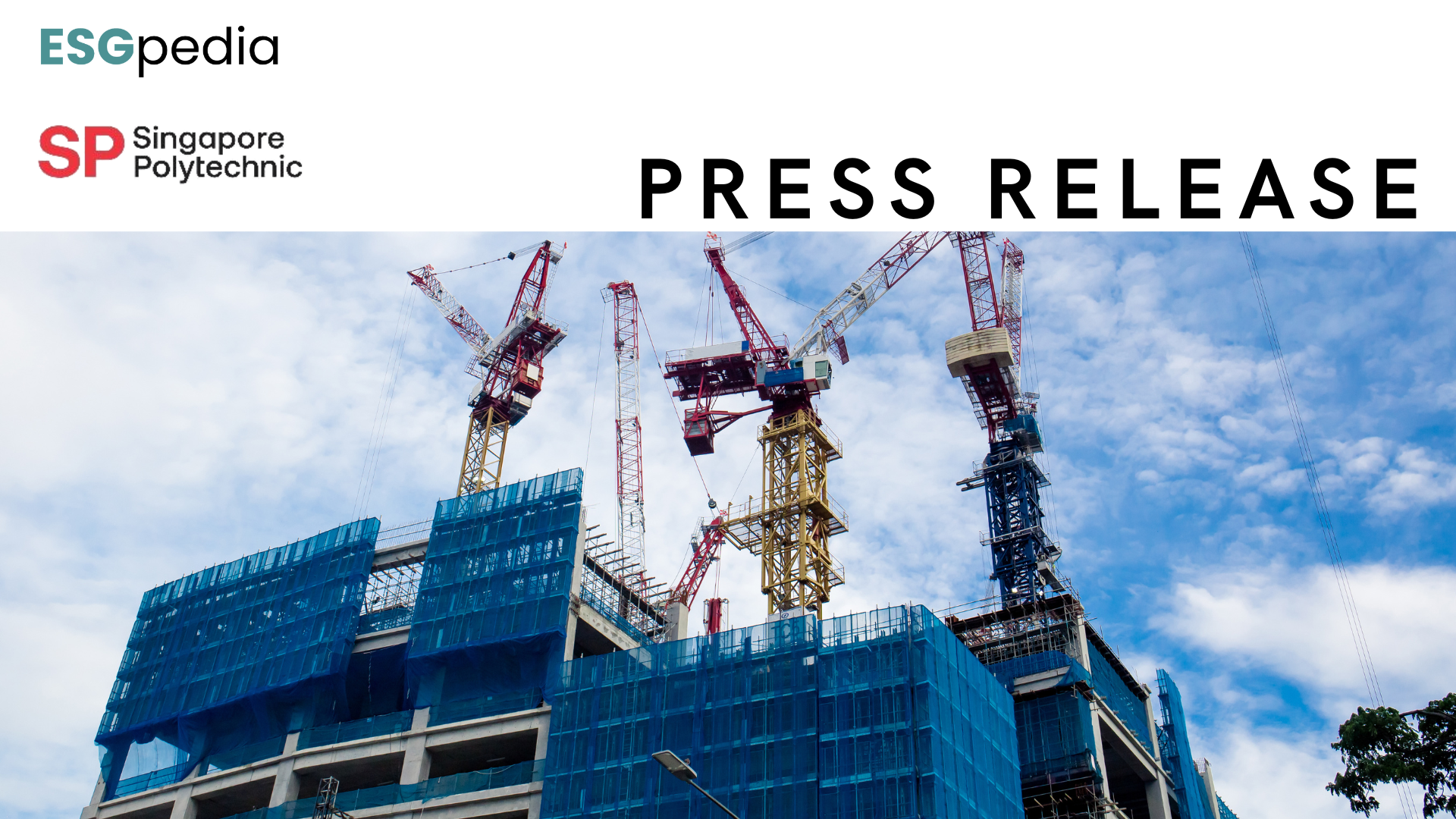SINGAPORE, 4 September 2025 – Singapore Polytechnic (SP) partnered with Asia’s leading Environmental, Social, Governance (ESG) data and technology company ESGpedia. The partnership aims to support the development of sustainability capability of local companies while leveraging ESGpedia’s digital platform to enable local companies – from small and medium enterprises (SMEs) to corporations – to achieve carbon accounting and improved energy efficiency.
Beyond sustainability capability development and carbon accounting, the programme also involves the Energy Efficiency Grant (EEG) (Advanced Tier), which Singapore Polytechnic has been whitelisted by the Building and Construction Authority (BCA) and the National Environment Agency (NEA) as a third-party assessor, for companies to purchase energy-efficient equipment of up to S$350,000. The EEG helps businesses transition towards lowering their carbon emissions by co-funding investments in energy-efficient equipment.[1]
The programme has two main components to help businesses build capability and capacity in sustainability and take steps towards decarbonisation:
- ESGpedia will be providing its standards-aligned carbon accounting and sustainability reporting solutions to help businesses accurately quantify and track their greenhouse gas (GHG) emissions, and
- SP will deliver sustainability learning journeys, training, and consultancy projects to companies using ESGpedia’s carbon accounting and sustainability reporting platform, while providing their energy efficiency assessment under the EEG Grant to help businesses decarbonise.
Lam Kok Seng, Centre Director, Centre for Environmental Sustainability & Energy Efficiency at Singapore Polytechnic, said: “Singapore Polytechnic’s (SP) partnership with ESGpedia enhances the development of our staff’s capability in delivering joint industry trainings and consultancy projects. This opportunity also allows SP to expand its ecosystem and leverage the business network for sustainability initiatives, including joint industry engagements to enable knowledge sharing and the opportunity for SP’s students to work on real-world sustainability projects.”
Benjamin Soh, Founder and Managing Director at ESGpedia, said: “Energy efficiency is key in the pursuit of a more sustainable and economically viable future. We are delighted to be partnering with Singapore Polytechnic to help businesses like LBD Engineering establish and track their greenhouse gas emissions, embark on standards-aligned sustainability reporting, and tap on energy efficiency services through the Energy Efficiency Grant (EEG) to decarbonise their value chains.”
As of today, successful implementations include LBD Engineering. As a leading builder (BCA Grade A1) with diverse construction capabilities, particularly in public housing programs, foundation works, and heavy machinery support, LBD Engineering has adopted ESGpedia to effectively calculate and track its Scope 1, 2, and 3 GHG emissions and credibly generate its Sustainability Report.
As a next step to having established their baseline E, S, and G metrics, LBD Engineering has utilised Singapore Polytechnic’s assessor services for energy efficiency under the EEG Grant to assess the eligibility of Infinity Cube’s Battery Energy Storage System (BESS) for sustainable construction. This will improve their operational efficiency, decarbonise their value chain, and reduce their environmental impact.
This has, in turn, had a positive financial impact on LBD Engineering by strengthening its competitiveness in securing project tenders, given the growing demand for greener buildings in both the public and private sectors. The Singapore government will start including environmental criteria for government projects in 2024.
Lim Boon Huat, CEO at LBD Engineering, said: “Beyond corporate responsibility, LBD Engineering believes that improving our sustainability posture leads to better business growth. We have hence worked with ESGpedia, to utilise their digital platform to calculate our carbon emissions and generate our Sustainability Report in accordance with the Global Reporting Initiative (GRI). We are pleased to be able to take active steps to improve our energy efficiency through Singapore Polytechnic and the Energy Efficiency Grant, to achieve further cost-savings and build stakeholders’ trust.”
Oh Jun Rong, CEO at Infinity Cube, said: “At Infinity Cube, we see Battery Energy Storage Systems as an essential enabler of Singapore’s decarbonisation drive in the construction and built environment. By replacing or hybridising diesel generator use, our systems directly reduce emissions, improve fuel efficiency, and enhance power reliability. We are committed to working with institutes of higher learning such as Singapore Polytechnic to advance technical education, support pilot deployments, and equip local businesses with both knowledge and solutions to meet future carbon neutrality goals.”
With the synergistic sustainability solutions, ESGpedia and SP will continue to drive a low-carbon, smart energy future in line with the Singapore Green Plan 2030 and accelerate local businesses’ sustainability journeys to help them better meet today’s evolving demands.
[1] As announced at Budget 2024, the EEG has been expanded to companies in Construction, Food Services, Manufacturing (including Food Manufacturing), Maritime, Retail sectors and users of data centres.
ESGpedia (www.esgpedia.io)
Grace Lim, Senior Marketing Manager
Email: [email protected]
Singapore Polytechnic (https://www.sp.edu.sg/)
Daryl Hung, Deputy Manager, Department of Communications
Email: [email protected]
About ESGpedia
ESGpedia (ESGpedia Pte Ltd) is Asia’s leading ESG data and technology company, headquartered in Singapore. The ESGpedia platform powers the ESCAP Sustainable Business Network (ESBN) Asia-Pacific Green Deal digital platform and the Asia-Pacific Single Access point for ESG Data (SAFE) initiative. With more than 5 million sustainability data points, ESGpedia serves as the Nexus of ESG, digitally empowering corporates, SMEs, and the financial sector to ensure compliance towards ESG regulations and attain their ESG goals. ESGpedia is GRI-licensed and ISO 14064-validated. For more information, please visit www.esgpedia.io.
LinkedIn: https://www.linkedin.com/company/esgpedia/
About Singapore Polytechnic
Established in 1954, Singapore Polytechnic (SP) is Singapore’s first polytechnic. It has 10 schools that offer 30 full-time diploma courses and four common entry programmes for more than 12,800 students. Pedagogical innovation is foremost at SP. We have implemented institution-wide Flipped Learning and are at the forefront of using Analytics in Education. SP also leads the global CDIO (Conceive-Design-Implement-Operate) Collaborative in the region. By ensuring our curriculum is just in time with industry developments, we can offer a solution-driven internship programme to our industry partners.
At SP, we are committed to nurturing self-directed, versatile graduates who are also imbued with sound values so that they can be life ready, work ready, world ready, and be of service to industry and society. We have more than 240,000 graduates; among them are successful entrepreneurs, top executives in multi-national and public-listed corporations, industry leaders and professionals across various industries, and leaders in government.
SP clinched the inaugural ASEAN People’s Award in 2015 for contributing to the region’s community-building efforts. We are also the first polytechnic to be awarded the President’s Award for the Environment in 2010, the President’s Social Service Award in 2011, and the President’s Award for Teachers in 2017, 2018, 2020, 2023 and 2024.
For more information, visit www.sp.edu.sg. Follow SP on Facebook and YouTube @SingaporePolytechnic and Instagram and TikTok at @SingaporePoly.




